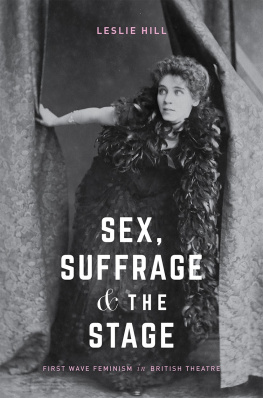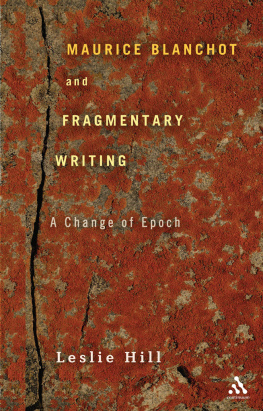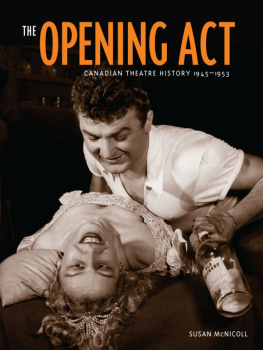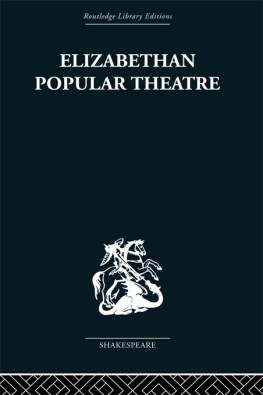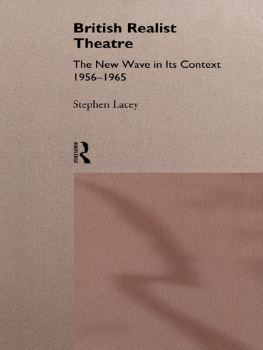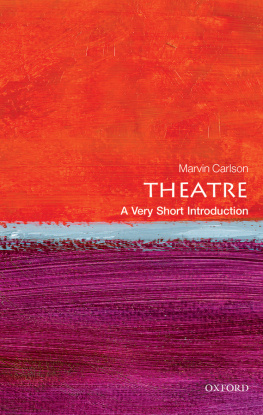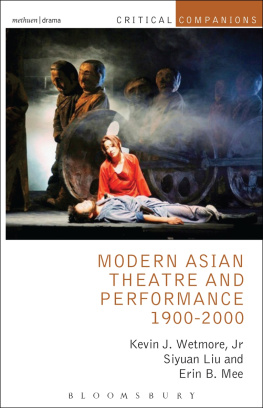In the winter of 1889 Elizabeth Robins was still struggling to break into the London theatre scene. Living in a boarding house and saving precious coins by walking long distances across London instead of taking the bus, she wore holes in her shoes, and suffered frequent colds. Oscar Wilde encouraged her to stay in England, took her under his wing and helped her get an agent. Some of the advice he gave over tea and cigarettes, however, may have done more harm than good to her career. Wilde advised his protge against taking the lead she was offered in A Fair Bigamist , a woman-centred play written by a woman, and instead directed her towards male actor-managers, introducing her to the celebrated and powerful Herbert Beerbohm Tree. Ten years older and married, Tree flirted with her career hopes for months but while he frequently sent her box seats to watch him perform, the parts he promised her never materialized.
In January, Robins was barely making ends meet playing the young widow Mrs Errol, p. 176). As the company for his new play, The Profligate , was already engaged, he could only offer her the tantalizing but thankless work of understudying the coveted fallen woman role of Janet Preece. The play ran for months, but never with Robins in the part she so desperately wanted to play. Registering her frustration, Robins confided to her diary, I would be made in London if I could play that part (p. 183).
The vexations of Robinss early London career shines a light on some of the complexities of the Victorian double standard in relation to actresses. Codes of behaviour for men like Tree who owned theatres were infinitely freer and less dangerous than for the women who sought work in them. Being an actress, a profession still sometimes associated with prostitution, relied on pleasing men to get work and made keeping ones reputation tricky. Tree propositioned Robins to become his mistress and in refusing his sexual advances she forfeited the parts she might have played at The Haymarket. Robins likened the shock of the episode to being stung by a hornet, extrapolating the general precariousness of life for single actresses from the experience: I knew now how this might come to anybody, since it had come to me (p. 243). This was by no means the only unwelcome sexual attention Robins received from men in her professional circle. In exasperation, she sometimes resorted to brandishing a pistol to deter them. But while carefully guarding her personal reputation off stage, Robins knew that playing parts like the mawkish Mrs Errol would not make her a star; on stage she needed a part like the sexually transgressive Janet Preece to make her. Like many women of her generation, Robins was caught somewhere between the moral standards of the sexually pure Victorian angel and London theatres fin de sicle fascination with the fallen woman. To be an actress with a future, you needed to play a woman with a past on stage without becoming a woman with a reputation off stage.
The Angel in the House and the Fallen Woman
Theres nothing left of what she was;
Back to the babe the woman dies,
And all the wisdom that she has
Is to love him for being wise.
(Patmore, 1890, p. 123)
Separate spheres had become a widespread middle-class ideology in the mid-Victorian period, famously typified in Coventry Patmores wildly popular 1854 poem The Angel in the House,
In step with the new evangelical movement of the nineteenth century, the womans domestic sphere was conceived of as the centre of purity and the higher sentiments while the male sphere encompassed the material world of industry and commerce. The Victorian man was defined in terms of public action, the woman in terms of domestic influence achieved modestly through piety, self-sacrifice and motherhood. From early in Victorias reign, women were constructed as the moral guardians of the home and, by extension, protectors of the moral worth of the nation. For women to exercise influence in this paradigm, they had to renounce independent public action, putting them in a complex and often contradictory relationship with power in the temporal world.
The rhetoric of separate spheres advice given through books, pamphlets, poetry, speeches and sermons was not, of course, as nuanced as womens actual lives, womens colleges and theatres provided women with more access to the modern freedoms of the cities, blurring some of the boundaries of male and female spheres.
As more middle-class women benefited from legal and educational reforms, taking advantage of new opportunities for independence, a backlash rose to counter the instability of changes to social convention. The theatre became not only a physical site where men and women both participated publicly as consumers of culture, it became an ideological battleground where female transgressions could be thrillingly observed and symbolically punished, mining the excitement of a new order while pandering to the conventions of the old. Female characters in late-Victorian theatre were frequently polarized as either pure angels or tainted fallen women, outcast from society through sexual transgression. As a dramatic character the fallen woman unsurprisingly held a much greater fascination for dramatists than the angel. Sin has always been more marketable than virtue and the fin de sicle obsession with the woman question made issues of womens independence and sexual morality paramount. Because chastity was regarded as a womans highest virtue, and because Victorians didnt draw clear distinctions between romantic seduction and sexual assault, the term fallen woman could encompass anything from a deflowered ingnue to an unwed mother to a mistress, a courtesan, a prostitute or a victim of sexual abuse. In theatre, the fallen womans fate was often a shame-driven suicide which allowed the audience to be titillated by her past and pity her wretched remorse without having to worry about her future. Fallen woman characters appear frequently in problem plays of this era, peaking in the mid-1890s in works such as Oscar Wildes Lady Windermeres Fan (1892), Arthur Wing Pineros The Second Mrs Tanqueray (1893), Janet Achurchs Mrs Daintrees Daughter (1894) and Constance Fletchers Mrs Lessingham (1894). Variations on the fallen woman theme continued into the twentieth century with plays such as Clotilde Gravess London Vendetta (1906), Elizabeth Robinss Votes for Women! (1907) and Githa Sowerbys Rutherford and Son (1912).
Fallen women often share characteristics in common with the New Woman and many female characters in this period are both fallen and New. (Readers unfamiliar with the term New Woman will find a detailed description at the start of the next chapter.) The fallen woman characters discussed in this chapter are sexual transgressors, while the next chapter focuses on social transgressors who are often, but not always, sexually active. Sos Eltis, whose book Acts of Desire is the consummate study of the stage history of the fallen woman, cites first-wave feminisms campaigns for expanded rights and opportunities for women as causative factors in the ubiquity of fallen woman plays at the turn of the twentieth century (2013a, p. 115). When linked to the independent figure of the New Woman, the fallen woman could serve as a reactionary anti-feminist warning, dramatizing the perils awaiting women who ventured beyond their proper sphere and took sexual liberties reserved for men.

